“The UK Supreme Court is entirely accustomed to analysing human rights (protected by the European Convention on Human Rights), but if you ask those daily tackling crime, the answer is they’re rarely necessary in the average criminal trial”, noted Lord Hughes of Ombersley, former Justice at the UK Supreme Court, opening up his keynote address in Goldsmiths Law’s annual criminal justice symposium at the British Academy (on 27 March 2019).
The reason is that these rights are “implicit in English criminal procedure”; “we had arrived at these rights long before the drafting of the European Convention on Human Rights” (ECHR), he explained, taking the examples of ‘habeas corpus’, which had been guaranteed for the best part of three centuries before finding its way into Article 5 of the ECHR, the ‘burden of proof’, which was in place hundreds of years before being incorporated into Article 6, or the prohibition of torture, which was inherent in the common law since the 17thcentury.
What is interesting is the discussion about the extent and scope of rights since their incorporation into the ECHR via the mechanics of “fairly energetic judicial glossing in Strasbourg”, Lord Hughes pointed out.
He invited English criminal lawyers, and the many scholars attending the symposium, to look at two features of this process of judicial creativity.
The first, most obvious, feature was the extent of it. “These fundamental rights have been expanded enormously”, noted Lord Hughes.
The second feature is the very interesting interaction between the common law and European civil law traditions, which does not have the starting point as the common law when it comes to interpreting the Convention.
We need to “remember that whilst the common law may be very longstanding, and we’re rightly proud of it, and it may be very widespread across the world, and we’re rightly proud of that as well, it is by no means a universal system”, said Lord Hughes.
In highlighting the idiosyncratic character of the European Court of Human Rights, the former Supreme Court Justice, whose illustrious career included the Vice-Presidency of the Criminal Division at the Court of Appeal, added:
 “It also behoves us to remember the difference between running a very long-established legal system such as ours in which an enormous amount can be taken as read, and, on the other hand, running a transnational court such as the Strasbourg Court where the judges come from an enormous variety of cultures, from a huge range of personal career experience, where there is no single common language, where the range of systems under consideration is enormous”.
“It also behoves us to remember the difference between running a very long-established legal system such as ours in which an enormous amount can be taken as read, and, on the other hand, running a transnational court such as the Strasbourg Court where the judges come from an enormous variety of cultures, from a huge range of personal career experience, where there is no single common language, where the range of systems under consideration is enormous”.
“The Strasbourg Court is having to cope with all the systems of former Eastern Europe as well as former Code Napoleon central Europe as well as the common law, and when we run into occasional elements of frustration, we ought to remember just how difficult it is to administer a transnational court of that kind”.
In discussing examples of “direct importation into the UK systems of fundamental rights as interpreted in Strasbourg”, Lord Hughes started with the “very well-known example of Cadder” (which led to the incorporation of the right to speak to a lawyer from the beginning of police interrogation in Scotland).
The reform was in reality “judicial legislation in Strasbourg based on the kind of review of national practice all around the Council of Europe which they’re in the habit of conducting; it’s one of the things they do extremely well, to produce a synthesis of practice around the member-states”.
One other way in which rights had been expanded was by attaching to an Article of the Convention an ancillary or secondary duty to investigate things that might involve a breach, said Lord Hughes.
The classic example was “Article 2 inquiries into deaths in state custody or state hands”. “Article 2 does not say anything at all about investigation, but it’s a perfectly rational extension on the basis that the primary right won’t be effective unless you also have a secondary right to investigation. But it is pure judicial legislation of the kind which – if it happened in relation to an English statute by an English court – would attract, rightly, some would say, a great deal of criticism”.
A similar duty to inquiry had been expanded to Article 3 of the Convention, as illustrated in the case of Commissioner of Police of the Metropolis v DSD (the John Worboys case). “The effect of the expansion of Article 3 is that a victim of crime now has – as a result of DSD – a right of action against the police for breach of the secondary duty to investigate serious violence, and they will succeed if the police fall below reasonable standards”.
“It sounds perfectly straightforward, but entirely contrary to English tort law as it had stood until DSD; though police had public duties, they did not owe a duty of care to individual victims”, observed Lord Hughes.
He then asked:
“Does it matter that rights which are, as drafted, so expansively interpreted by judges – not by Parliaments, but by unelected judges, without any reference back to the States which originally agreed them?”
“Or maybe this is what states have voluntarily signed up to in accepting the Convention.”
In other words, Lord Hughes noted, these fundamental rights and their interpretation are a potent example of what is really a perennial problem faced by all legal systems, which is “how far should or can judges be creative in their interpretation of the Law or how far are they – like everybody else – bound by what it actually says; it’s a perpetual problem particularly faced by courts of final appeal but also, to some extent, by courts lower down”.
We could ask the same question by reference to other rights, for example Article 6 para 2 of the Convention, on the presumption of innocence or hearsay and the right to confrontation under Article 6.
It was equally important to observe, noted Lord Hughes, that although “a good deal of criminal procedure and evidence may fall to be reasoned according to fundamental rights, a larger part of English criminal procedure is entirely independent of fundamental rights”. Human rights are not “the prime source of our rules of fairness in the English criminal justice system; it’s actually the other way round … most of English criminal procedure was in place before these rights were derived from it very largely”.
“In fact, when the Convention was drafted, very largely by English lawyers, only some of the common law principles went into it. Others were deliberately left out, for example jury trial, the discretion not to prosecute (which would be quite incompatible with the Continental culture, where in many cases it is mandatory to prosecute), the cab-rank rule (the obligation of a barrister to accept any work in a field in which they practice, either acting for the defence or the prosecution), which wouldn’t work in Europe where you have division between public prosecutors and others, or the mandatory recording of police interviews.”
This line of thinking led Lord Hughes to a final conclusion:
While “these fundamental rights [ECHR rights] are very important – they’re often debated, they’re sometimes inspirational, they throw up the most fascinating meeting points of the common law and different legal cultures – they’re a long way from being the prime source of English criminal law and procedure.”
“They’re fundamental to us, in the sense that their ideas are embedded in our system, absolutes they’re not and we need to be careful about claiming that they’re absolutes.”
“The reality is that there is a huge scope for debate about their content and that debate has to be resolved by judges by exactly the same tensions that you meet domestically between the legitimate bounds of judicial creativity and the rule that judges – like anybody else – are bound by the law.”
“That’s a tension which has to be resolved here as it does everywhere else. They’re fundamental rights, they’re not absolute rights.”
LSE’s Prof Nicola Lacey chaired the keynote address.
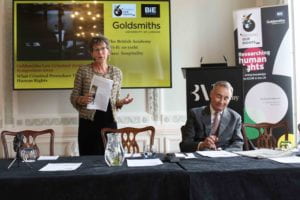
Prof Nicola Lacey: Lord Hughes’ keynote raises some fascinating comparative and socio-legal questions about the impact of different legal cultures and different institutional structures in how courts work and how communication between systems works.
The symposium was coordinated by Goldsmiths’ Head of Law Prof Dimitrios Giannoulopoulos, and it was attended by major experts in criminal justice and human rights, from the UK and abroad.
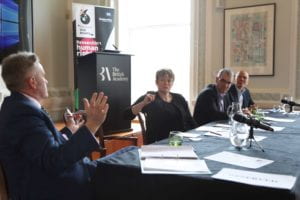
from left to right: Prof Paul Roberts (Nottingham), Hannah Quirk (King’s), Richard Glover (Wolverhampton) and Prof Andrew Choo (City)
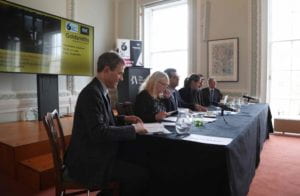
from left to right: Prof David Sklansky (Stanford), Yvonne Daly (DCU), Prof Dimitrios Giannoulopoulos (Goldsmiths), Prof Sarah Summers (Zurich), Prof Theodore Konstantinides (Essex) and HH Judge Donald Cryan (Visiting Prof, Goldsmiths)
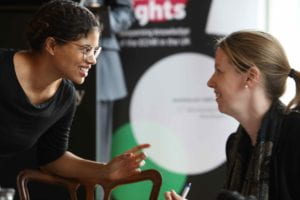
Abenaa Owusu-Bempah (LSE) with Prof Sarah Summers (Zurich)
The symposium followed up on Goldsmiths Law’s criminal justice lecture, which took place the day before and was delivered by Stanford Law School academic Prof David Sklanksy.
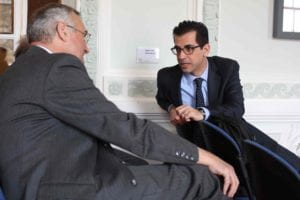
Goldsmiths’ Prof Giannoulopoulos with Lord Hughes. The Inner Temple’s academic fellowship scheme has brought Goldsmiths Law closer to the profession, including eminent representatives of the UK judiciary and Justices at the Supreme Court
The Department of Law at Goldsmiths places strong emphasis on the study of criminal justice and human rights. Students taking the LLB Law at Goldsmiths can choose to specialise in these subjects, by taking the synonymous pathway degree (LLB Law with Criminal Justice and Human Rights).
For information on the annual criminal justice symposium or the LLB Law and LLB Law with Criminal Justice and Human Rights degrees contact the Law department at Law@gold.ac.uk
Photo credit: Richard Gardner